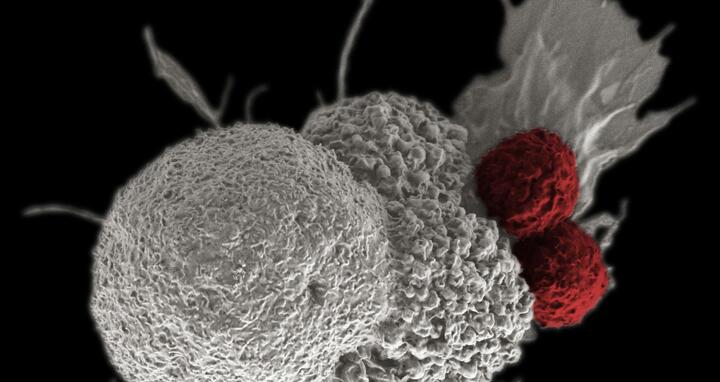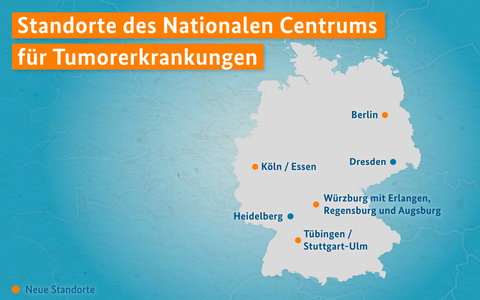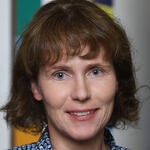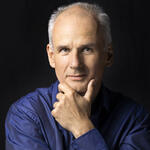National Center for Tumor Diseases in Berlin
Joint PRESS RELEASE by the BIH, Charité and the MDC
The State of Berlin not only strongly supported the application but is planning the construction of a new innovative facility for the NCT, which is expected to be located in Berlin-Wedding.
As part of the National Decade Against Cancer, whose goal is to accelerate the transfer of findings from cancer research to patients, the Federal Ministry of Education and Research (BMBF) is supporting the establishment of four additional locations of the National Center for Tumor Diseases (NCT). To achieve this, the German Cancer Research Center (DKFZ) is cooperating with outstanding university medical centers. Within the NCT, physicians and researchers work closely together to provide each patient with a personalized cancer treatment plan. Up to now there have been two NCT locations, in Heidelberg and Dresden. The four new locations will give even more oncology patients access to innovations in personalized oncological medicine. In addition to Berlin, the locations Cologne/Essen, Tübingen/Ulm/Stuttgart and Würzburg/Erlangen/Regensburg were chosen in a competitive selection process.
Michael Müller, Governing Mayor of Berlin and Senator for Science and Research, congratulates the team from Charité – Universitätsmedizin Berlin, the Berlin Institute of Health (BIH) and the Max Delbrück Center for Molecular Medicine in the Helmholtz Association (MDC), emphasizing: “The decision to establish a National Center for Tumor Diseases in Berlin is a terrific success for our entire healthcare hub. It underscores the innovative capacity of our research institutions and shows that our strategy to further develop Berlin as a scientific and medical location is the right course of action. Berlin will thus play a key role in advancing cancer research and developing new strategies for the early detection and treatment of cancer.”
Professor Heyo K. Kroemer, Chief Executive Officer of Charité, views the selection of Berlin as an NCT location as a great opportunity for everyone involved: “We are delighted with this decision, which will support us enormously in our efforts to further strengthen cancer research and treatment in Berlin. Combining research and clinical practice under one roof is the overarching aim of all departments at a university medical center, because this benefits not only physicians and scientists but most of all patients.”
Berlin is already home to excellent cancer research and treatment
Three strong cooperation partners have developed the NCT location: Charité, the BIH and the MDC. Professor Ulrich Keilholz, head of the Charité Comprehensive Cancer Center (CCCC) and coordinator of Berlin’s NCT application, is delighted with the selection: “With the CCCC, Charité is already ensuring comprehensive healthcare for cancer patients and carrying out translational cancer research. Each patient receives an individual treatment plan, which is prepared by a multidisciplinary team of specialists. We also enable participation in clinical trials. As the future NCT Berlin location, we will be able to undertake more effective research and provide more advanced treatment as well as further expand our expertise.”
Co-coordinator Professor Angelika Eggert not only leads the Charité’s Department of Pediatrics, Division of Oncology and Hematology, but is also the Berlin spokesperson for the German Cancer Consortium (DKTK) and sits on the BIH Scientific Committee. She and her team study new targeted molecular therapies and immunotherapies designed specifically for pediatric cancer. “The body’s own immune system plays a key role in the fight against cancer,” Eggert says. “Working with our colleagues here in Berlin we have been able to make major strides. We will greatly benefit from the nationwide collaboration with the other NCT locations across Germany, especially when it comes to treating the relatively rare cases of childhood cancer.”
Integrating research and clinical care under one roof
Professor Christof von Kalle, BIH Chair for Clinical Translational Sciences, heads the Clinical Study Center at the BIH and Charité. Before coming to Berlin, he helped found the NCT Heidelberg and served as its director for over ten years. He was also involved in developing the concept for the NCT Berlin. “From my extensive NCT experience in Heidelberg, I not only know how crucial it is to closely integrate research and clinical practice, but also how important it is to bring together different disciplines to fight cancer,” von Kalle says. “At the same time, we need to continue to press ahead with digitalization so as to maximize the benefits of the vast amount of data generated from research and from the treatment of thousands of cancer patients. Working together as NCT Berlin we can meet these challenges.”
Professor Axel R. Pries, interim Chief Executive Officer of the BIH and Dean of Charité, adds: “Medical translation requires constant dialogue between researchers and clinical practitioners. This is especially true in oncology: Cancer poses one of the biggest medical challenges of our time and is still characterized by severe progression – just half of cancer patients survive the disease. We urgently need new concepts, which we strive to develop here at the NCT Berlin location as rapidly as possible.”
The MDC is a research center with a focus on basic biomedical research. Its scientists aim to elucidate the molecular mechanisms of health and disease, and translate those findings into medical practice as quickly as possible. In the field of cancer medicine, they develop new immunotherapies and innovative key technologies such as 3D single-cell analysis, proteomics and metabolomics, which they incorporate into novel medical strategies with the help of artificial intelligence. Professor Thomas Sommer, interim Scientific Director of the MDC, is also pleased by the announcement: “Berlin will be an excellent location for the expanded National Center for Tumor Diseases: Here everything comes together perfectly. For us at the MDC it means that we can push forward our research and expertise in immunotherapy, cancer formation and cell-based cancer medicine. And through our close collaboration with Charité and the BIH we strive to quickly transfer our findings into benefits for patients. It’s about creating the personalized oncology of the future.”
Precise cell-based cancer medicine
The unique expertise of the three cooperation partners make Berlin an outstanding international location for systems biology and clinically applied single-cell technologies. The NCT Berlin team has developed, under the direction of Professor Nikolaus Rajewsky (MDC), a groundbreaking concept for cell-based cancer medicine. In addition to the clinical NCT programs, this focuses on three key areas:
1. Precision oncology: To ensure patients receive the best possible treatment, tumors must be precisely diagnosed and their development must be well understood. The partners will achieve this by systematically employing a wide range of precision oncology methods. Along with multi-omics technologies, the methods used will include comprehensive patient-derived preclinical models as well as machine learning and innovative single-cell technologies with extraordinary spatial resolution that enable researchers to find out whether tumors are sensitive or resistant to certain treatments.
2. Immunotherapy: The NCT cooperation partners will use Berlin’s extensive expertise in immunotherapy to develop new adoptive T-cell therapies (TCR and CAR T cells) both at the preclinical and clinical levels. The large existing GMP facilities will enable the new immunotherapies to be manufactured on-site. New target structures for the immunotherapy can be identified using single-cell technologies. Working with the other NCT locations, a comprehensive national network for cancer immunotherapy will be established.
3. Big data: The excellent IT infrastructure of the Charité Comprehensive Cancer Center (CCCC), current programs of the German Cancer Research Center (DKFZ)/German Cancer Consortium (DKTK), and the BIH Digital Health Program will pursue a common goal: to link clinical data with molecular diagnostics and preclinical models in order to develop individualized therapeutic strategies for each patient and advance digital health solutions.
More than 50,000 cancer patients to be treated each year
The CCCC is coordinating the planning of the NCT Berlin location and in the future will be integrated into the NCT Berlin. All relevant disciplines and patients’ spokespersons are represented on the NCT Berlin’s steering committee. An NCT building is planned for construction on the new clinical research campus at the Charité Campus Virchow Clinic. The 10,000-square-meter facility will house state-of-the-art research laboratories, an outpatient clinic and an information center for cancer patients. The BIH/Charité Clinician Scientist Program and numerous other training opportunities make Berlin an attractive location for the recruitment of young talent in the field of cancer research. The area covered by the NCT Berlin will include not only the capital city of Berlin, but also Brandenburg and Saxony-Anhalt, a combined total of 8.6 million people or about a tenth of the German population, with more than 55,000 newly diagnosed cancer cases a year.
Background
The National Center for Tumor Diseases (NCT) Heidelberg was founded as a joint institution in 2003 by the German Cancer Research Center (DKFZ), the Heidelberg University Hospital (UKHD) and German Cancer Aid, making it Germany’s first Comprehensive Cancer Center. The NCT’s goal is to quickly transfer promising approaches from cancer research to the clinic and thus improve the chances of cancer patients. This includes both diagnosis and treatment as well as follow-up care and prevention. The tumor outpatient clinic is the central element of the NCT. Here patients benefit from an individual treatment plan prepared in interdisciplinary expert panels, known as tumor boards. Participation in clinical studies provides access to innovative therapies. The NCT thereby acts as a pioneering platform that translates novel research results from the laboratory into clinical practice. The NCT cooperates with self-help groups and supports them in their work.
Further information
Single-cell analysis at the MDC
Single-cell technologies for personalized medicine – focus area together with the BIH
Höpken Lab: Microenvironmental Regulation in Autoimmunity and Cancer
N. Rajewsky Lab: Systems Biology of Gene Regulatory Elements
- The Max Delbrück Center for Molecular Medicine (MDC)
-
The Max Delbrück Center for Molecular Medicine in the Helmholtz Association (MDC) is one of the world’s leading biomedical research institutions. Max Delbrück, a Berlin native, was a Nobel laureate and one of the founders of molecular biology. At the MDC’s locations in Berlin-Buch and Mitte, researchers from some 60 countries analyze the human system – investigating the biological foundations of life from its most elementary building blocks to systems-wide mechanisms. By understanding what regulates or disrupts the dynamic equilibrium in a cell, an organ, or the entire body, we can prevent diseases, diagnose them earlier, and stop their progression with tailored therapies. Patients should benefit as soon as possible from basic research discoveries. The MDC therefore supports spin-off creation and participates in collaborative networks. It works in close partnership with Charité – Universitätsmedizin Berlin in the jointly run Experimental and Clinical Research Center (ECRC), the Berlin Institute of Health (BIH) at Charité, and the German Center for Cardiovascular Research (DZHK). Founded in 1992, the MDC today employs 1,600 people and is funded 90 percent by the German federal government and 10 percent by the State of Berlin.
Contact
Jutta Kramm
Leiterin der Abteilung Kommunikation
Max-Delbrück-Centrum für Molekulare Medizin in der Helmholtz-Gemeinschaft (MDC)
+49 (0)30 9406 2140
jutta.kramm@mdc-berlin.de oder presse@mdc-berlin.de








